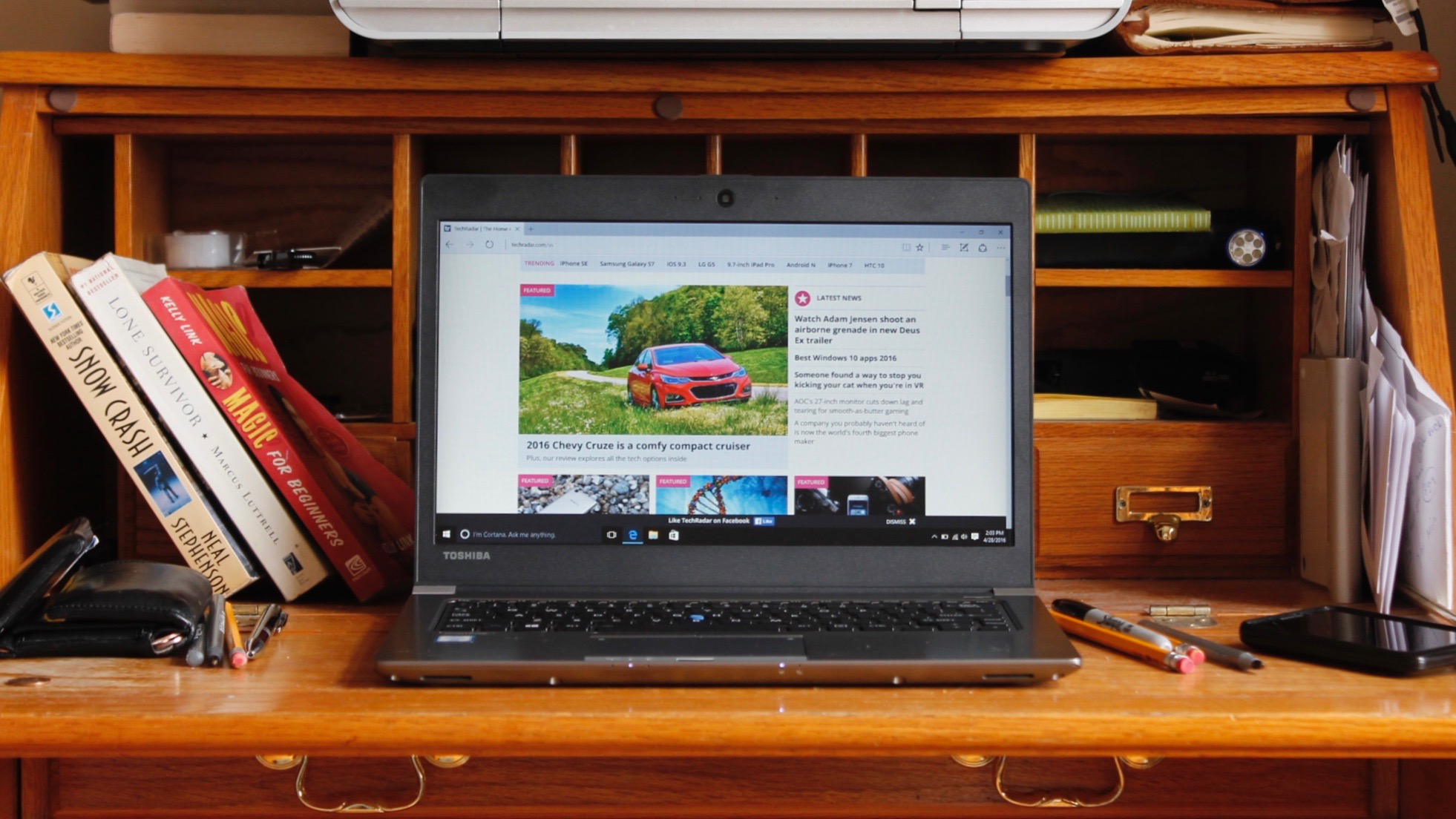Why you can trust TechRadar
All this utility comes at a price too. At $1,470, the Portégé Z30 is more expensive than comparable ultrabooks like the Lenovo Yoga 900 ($1,199, £797, AU$1,705), the Asus ZenBook UX303 ($800 or £770, about AU$1051) and the Dell Latitude 13 7000 ($580, £410, AU$756).
Its price ultimately makes the Portégé Z30 a niche machine. Those who travel often for business will gush at its ports and fingerprint scanner, but the average user will have trouble dropping $1,400 for an ultrabook with a lackluster non-touch, unconvertible screen.
Here is the Toshiba Portégé Z30's configuration sent to techradar for review:
Spec Sheet
- CPU: 2.6 GHz Intel Core i7-6600U (dual-core, 4MB cache, up to 3.4GHz with Turbo Boost)
- Graphics: Intel HD Graphics 520
- RAM: 8 GB DDR3L 1600 MHz Memory
- Screen: 13.3-inch, 1,366 x 768 widescreen HD TFT LED Backlit display
- Storage: 256GB SSD
- Ports: 3 x USB 3.0 ports (1 with USB Sleep and Charge), Memory Card Reader, HDMI output port, RGB port, Ethernet port, Microphone/Headphone combo jack, Docking Connector
- Connectivity: Intel Dual-Band Wireless-AC 8260 plus Bluetooth
- Camera: Full HD webcam with dual microphones
- Weight: 2.65 pounds
- Size: 12.44 x 8.94 x 0.55 (W x D x H)
This high-end Z30 configuration is equipped with Intel's sixth generation core i7 processor, which, aside from its excellent port diversity, is one of the hardware highlights of the device. That said, there are cheaper ultrabooks on the market that also have core i7 processors, and better storage and memory to boot.
The Yoga 900 is $370 cheaper than the Z30 yet it has a 512GB solid state drive and 16BG of RAM – double of what Toshiba's ultrabook holds. The ZenBook UX303 starts at only $800, but it nearly matches the Z30's specs while delivering (as I've already mentioned) a much better screen.
Where the Z30 truly shines is in the breadth and number of its ports. None of the other ultrabooks previously mentioned, not even the Latitude 13 7000, have an RGB port, or a dedicated Docking Connector since Dell has gone to a USB-C solution.
The Z30 is one of the few ultrabooks prepared to interface directly with those not-quite-obsolete hardware, like projectors and hardwired Internet connections.
Sign up to the TechRadar Pro newsletter to get all the top news, opinion, features and guidance your business needs to succeed!
In terms of ports, only the ZenBook UX303 comes close. Like the Z30, it also has 3 USB 3.0 ports and an Ethernet jack, but the ZenBook's mini-DisplayPort is not as useful as an RGB. With the ZenBook, client-visiting business users will still have to scramble for an adapter.
Benchmarks
Here's how the Toshiba Portégé Z30 performed in our suite of benchmark tests:
- 3DMark: Cloud Gate: 4,423; Sky Diver: 3,175; Fire Strike: 590
- Cinebench CPU: 330 points; Graphics: 35.13 fps
- GeekBench: 3,006 (single-core); 6,420 (multi-core)
- PCMark 8 (Home Test): 2,706 points
- PCMark 8 Battery Life: 5 hours and 9 minutes
Even if the Z30's display and speakers are up to snuff, its Internet-and-Office geared hardware prevent it from ever being mistaken for an everyday consumer machine. Once again, the Portégé affirms that it is all business.
However, it and the other ultrabooks in its category can squeeze some juice out of their hardware when needed: achieving 35 fps on the Cinebench test certainly proves that, as does its average Cloud Gate and Sky Diver scores in comparison with other Core i7-powered notebooks.
The PCMark 8 benchmark cannot be ignored, especially considering the Z30's "business first" value proposition. The Home Test runs the laptop through a set of rigorous but ubiquitous tasks (like web surfing and video conferencing) in order to evaluate its multitasking capabilities.
The Z30's 2,706 is an average score, on par with the Yoga 900, well above the Latitude 13 and a bit behind the ZenBook UX303 – of course, the latter two use power sipping Core m processors.
This PCMark 8 score supports my anecdotal experience too. I wrote this review on the Z30, with multiple tabs open and a music streaming service playing in the background, and it performed admirably, never slowing down or struggling to open a file.
PCMark 8's battery test also places the Z30 firmly in the average camp. At under five and a half hours, its battery life is very similar to other ultrabooks.
However, in our informal battery test (review writing with multiple programs/tabs open and streaming music), the Portégé fares better than its competitors, lasting seven and a half hours.
Only the Yoga 900 matches it, while the ZenBook UX303 and Latitude 13's batteries fall behind. They peter out after six and half and five and a half hours of use, respectively.
Current page: Specifications, Performance and Features
Prev Page Introduction and design Next Page Verdict